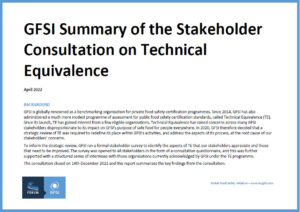In 2021, GFSI launched a strategic review of its Technical Equivalence process with an extensive stakeholder survey, as well as targeted interviews. This gathered responses from all key stakeholder groups of the Technical Equivalence process: Public Standard Owners currently acknowledged or attracted by the GFSI Technical Equivalence process, GFSI-recognised Certification Programme Owners, Certification Bodies, Food Business Operators and Service Providers. We are now pleased to present you with the summary of these responses.
Stakeholders were all in broad agreement that the Technical Equivalence process improves overall food safety. Cited reasons included its foundation in Codex Alimentarius and ISO guidelines and standards, and its robustness and rigour. Acknowledged standard owners also reported the improved status they derived from their association with a GFSI assessment process.
Stakeholders also reported that some buying companies turned down certificates from acknowledged standards because the Technical Equivalence process did not include a review of the standard owner’s governance, and this limited market access to certified sites.
The most significant challenge reported in the survey was a misunderstanding of the GFSI Technical Equivalence process by Food Business Operators (both suppliers and buying companies), and the confusion it created between GFSI-recognised Certification Programmes and GFSI-acknowledged standards.
Stakeholders suggested solutions to those challenges. GFSI is always grateful for the time and helpful feedback our community provides us. Once again, this first step of the strategic review of our Technical Equivalence process delivered extremely valuable insights and recommendations that we will now debate carefully before updating our community on next steps.
To view the full summary, download here.
